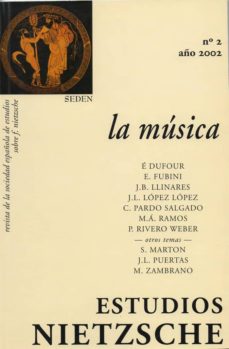Música absoluta y ‘Wort-Ton-Drama’ en el pensamiento de Nietzsche
DOI:
https://doi.org/10.24310/EstudiosNIETen.vi2.8791Abstract
¿Se dio realmente esa completa adhesión, de la que se habla a menudo, de Nietzsche al pensamiento y a la música de Wagner, antes de la ruptura fatal entre ambos, debida al presunto giro wagneriano con el Parsifal, con la contraposición de la luminosidad mediterránea de la Carmen a la décadence y al Romanticismo enfermo de la última obra wagneriana? Quizás, tras una lectura más atenta de los documentos puede salir a la luz que la disensión frente a Wagner no explotó a causa del Parsifal, sino que se daba ya desde siempre, aunque no se manifestara, en el pensamiento de Nietzsche, quien en realidad nunca estuvo en sintonía con la estética del Wort-Ton-Drama wagneriano.
Downloads
Metrics
References
Dalhaus, C., Die Idee der absoluten Musik, Bärenreiter, Kassel, 1978.
Hoffmann, E. T. A. ,Schriften zur Musik, ed. F. Schnapp, München, 1963.
Knaus (ed),J., Über Musik und Wort, in Sprache, Dichtung und Musik, 1973.
Nietzsche, F., Correspondencia I-VI. (CO). Director ed. Luis E. de Santiago Guervós. Madrid : Trotta, 2005- 2012.
Nietzsche, F., Fragmentos Póstumos I-IV (FP). Director ed. Diego Sánchez Meca. Madrid: Tecnos, 2006-2010.
Nietzsche, F., Frammenti postumi, 7, aprile 1871, en Opere, ed. G. Colli y M. Montinari, Adelphi, Milano, 1989, vol. III, tomo III, parte I, p. 189.
Nietzsche, F., Obras Completas, I-IV (OC ). Director ed. Diego Sánchez Meca. Madrid: Tecnos, 2011-2016.
Nietzsche, R.Werke in drei Bänden, ed. K. Schlechta, Darmstadt 1966, vol. II.
Schopenhauer, A., Die Welte als Wille und Vorstellung.
Wackenroder, W.H., Seelenlehre der heutigen Instrumentalmusik.
Wagner, R., «Bericht über die Aufführung der nenten Symphonie von Beethoven im Jahre 1846 nebst Programm dazu», en Schriften und Dichtungen, Insel Verlag, Frankfurt, 1983, pp. 23-24.
Wagner, R., Gesammelte Schriften, Berlin und Leipzig, vol. III, p. 231.
Downloads
Published
How to Cite
Issue
Section
License
As of issue 21 (2021) this journal is published only in open access (diamond route).
From that number 21, like the previous numbers published in NIETZSCHE STUDIES, they are subject to the Creative Commons Acknowledgment-NoComercia-ShareIgual 4.0 license, the full text of which can be consulted at <http://creativecommons.org/licenses/by-nc-sa/4.0 >
It is the responsibility of the authors to obtain the necessary permissions of the images that are subject to copyright.
This work is licensed under a Creative Commons Attribution-NonCommercial-ShareAlike 4.0 International License.
Copyright generates two different rights: moral rights and patrimonial rights that EJFB recognizes and respects. Moral rights are those relating to the recognition of the authorship. They are rights of a personal nature that are perpetual, inalienable, unseizable and imprescriptible as consequence of the indivisible union of the author and his/her work.
Patrimonial rights are those that can be derived from the reproduction, distribution, adaptation or communication of the work, among others.







11.png)
